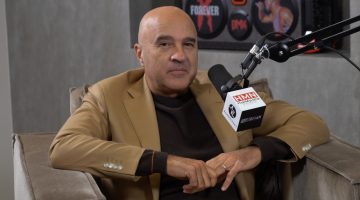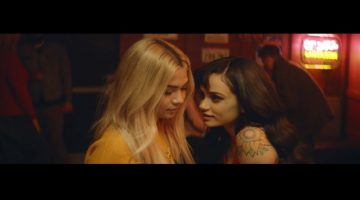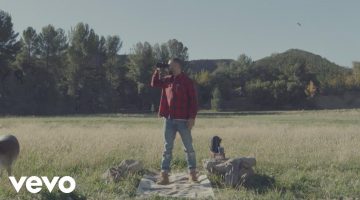NandoLeaks New Video: Dashni Morad – Be Free
Dashni Morad:
“They tried to keep me down; they tried to silence me. But all they ever achieved was to make me
fly.”
Dashni Morad is remarkable for many reasons. Back home in Iraqi Kurdistan, she is an inspirational
feminist figure, a prominent humanitarian, and a pop star that makes music with purpose. Having
been through a tragic journey of objectification and exploitation in the music industry back in her
homeland, Dashni today stands tall as a well-respected and talismanic figure over those whom caused
her to suffer. And whereas in the past she was forced to make music over which she had no control,
her experiences have nurtured her inner artistic flame, and today it burns brighter than ever.
Dashni was publicly shamed, threatened, harassed, manipulated and abused, but she could not be
silenced. Her story is one that women all over the world need to hear. She is a symbol of what, despite
the odds, women can achieve.
Her music, cultured pop beats with tribal and ethnic influences, and her lyrics, a feminist’s rallying
cry, both of which she employs to thrilling effect on her new album, ‘A Little Light in the Dark’–a
commercially driven powerhouse of a record with, unusually, a compelling backstory fuelling it. In an
increasingly small world where everything is known and nothing really surprises anymore, this woman
is genuinely captivating, her tale wrenched more from the news headlines than, say, the production
line from which so much of today’s pop limply springs.
Dashni considers herself primarily as a humanitarian, and sees her music as a tool to spread her
message. For the past three years, she has been building her own charity, Green Kids, which she setup to provide support to children in poverty and war, recently focusing more on refugee children. To
date, Green Kids has donated over 200,000 books to underprivileged schools across war-torn Iraqi
Kurdistan, established two mini-libraries at refugee camps, and collected money and other aid for
refugees.
We like to call all sorts of individuals inspirational, but few really rise to that level. Dashni does.
Dashni Morad was born in Sulaimaniyah, in Iraqi Kurdistan, at a time of great upheaval. It was 1986,
and Saddam Hussein was flexing his totalitarian muscles, so determined to eradicate the Kurds from
his land that he ordered his army to gas entire villages, and elsewhere to routinely kill as many of its
population as possible. His efforts were at least partly rewarded: hundreds of thousands died.
Ask Dashni for her earliest memories, and she will talk not of the school playground or summer
holidays on the beach, but of running after UN helicopters as they tossed food and aid into the
mountains in which she, her family and other Kurdish refugees, hid by day and by night, desperate to
survive.
“Every day people were dying,” she says, “but I was young, and I didn’t quite realise what was
happening. I knew that there were fewer and fewer of us. I would see the bodies of young children
draped in white sheets, and ask my father what the white sheets were for. He told me that they were
just playing.”
Her father, a truck driver, became increasingly desperate to protect his family. He sold everything he
had in order to raise enough money for the people smugglers to take them across the border, but
leaving Kurdistan was never going to be an easy task. He decided to go first, managing to get into
Turkey and from there, attempting to swim – swim – to Greece. During his many escape attempts, he
was caught, imprisoned and beaten, but eventually he made it, and from Athens he travelled – on foot
– first to Germany, and then to Holland, where he settled. Two years later, by now legally entitled to
extend an invitation to his family, he did so.
“I was 11 years old, and suddenly in a new place: Europe,” Dashni says. “It was nice at first, I liked it and it felt safe – but I couldn’t speak the language, and we soon found out what racism was firsthand.”
As immigrants living in rural Holland, Dashni and her family experienced racial discrimination, at
home and at school. They began to miss Kurdistan, and wondered if it had all been worth it. She is
reminded of those difficult times when she sees how refugees are being treated in Europe, which is
why she has decided to dedicate ‘Love Wins’ to the refugees’ cause.
Nevertheless, she and her three siblings eventually settled at the local school, where she excelled. But
Dashni was a shy girl, and felt conspicuously foreign. She withdrew.
“I lived in my own bubble, always in my parents’ bedroom in front of the mirror with a hairbrush for a
microphone, singing and addressing an imaginary audience. I always craved an audience. I guess I felt
I had something to say.”
Gradually assimilating herself into her new world, she began to play football for which she had a
natural flare, and for two years took pride of place in the school team. It was only when her parents’
Kurdish friends began to suggest that such a sport was not becoming for a girl that they put an end to
such dreams. Dashni would be of childbearing age soon, and in the meantime had housewifely duties
at home: the floors, after all, would not sweep themselves.
But Dashni was a product of her surroundings, and was becoming not merely westernised but
increasingly emancipated. Why should so many avenues be closed off to her simply because of her
gender? How could she remain so rigidly controlled by a tradition in which women were, essentially,
second-class citizens?
“I never asked to leave Kurdistan, did I?” she says. “But we did, and I became who I became – partKurd, part-Dutch, and proud.”
Increasingly she wanted to give voice to her feelings, but on a wider scale. At 19, she auditioned to
become a presenter on the satellite TV channel Kurdistan TV, and landed the role. For the next two
years she fronted a youth TV show for an international audience that had never come across such a
thing before. In this way, she became an inspiration to millions, a 21 st-century woman with her own
identity, refusing to have any limitations imposed on her by anybody. She was sent the kind of fanmail only trailblazers receive – and weathered the kind of invective only ever reserved for trailblazers,
too. Having recorded the show in Europe, she had no idea that she had become a superstar in
Kurdistan.
“I would get phone calls from men saying to me: Who do you think you are, to act like that on TV? I
never answered them directly, but I always said to myself: I will show you who I am.”
By the time she became a recording artist two years later, singing songs befitting someone who was
very much her own woman – one song, she recalls, concerned “having my lips on a guy’s lips” – she
was being denounced by the more conservative parts of society, such as Kurdish mullahs who would
speak out against her during prayer time. “One of them said I should be hanged with a rope of fire
around my neck. It became dangerous for me to visit my homeland.”
Meanwhile, she was experiencing similar battles at home.
“My parents are proud of me now, but the fight has been a long one,” she says, smiling sadly. “I would
always say to people to make sure you fight for your freedom at home first. But you see, I never had
any bad intentions in all this, I just wanted to express myself, to give other people hope, and to make
other people happy. When you have seen as much war and destruction as I have, you want only to
spread peace and love; freedom.”
Four years ago, she released the single Open Your Eyes, a song with a powerful message to her
detractors and fans alike. This prompted the beginning of new era, Dashni now receiving not only
widespread acceptance, but also adoration, especially across the Kurdish diaspora. The song was a
huge hit across the Middle East, and in Holland, too, and soon after Dashni was offered a record deal
with an established Lebanese record label. Just as Dashni’s music career seemed to take off, her
management team and financiers blocked the opportunity, as she became the victim of a cruel plot.
Thereafter, for reasons unknown, Dashni’s supposedly trusted backers pulled the rug from under her
feet, and withdrew their support.
Subsequently, and to her devastation, Dashni’s music career lay dormant for the next three years.
Dashni is 30 years old now, and divides her time between Holland, London and Kurdistan, while her
album was recorded as far afield as Los Angeles and Norway. With her new album, she plans to
crossover into the UK, the US, “and wherever else they’ll listen to me,” she says humbly, in an effort
to spread her message globally. As humble as she may be, this inimitable force of nature has great
ambition: to achieve gender equality and eliminate child poverty in Kurdistan, to change the way the
rest of the world sees Kurdistan, raising her homelands international profile, particularly in its quest
for independence, and to take Green Kids world-wide, focussing on its primary goal of educating
children about the environment and climate change.
“I have had to struggle a lot to be who I am, but I still love my country and my culture,” she says. “We
only ever hear of the negative things that come out of Iraq, Kurdistan, and across the Middle East,
but these are beautiful countries, filled with beautiful people. I want to show that side to these places.
I want to celebrate our multi-culturalism. Music is a tool; it can be a weapon you can use to tackle
issues. Of course, I want us all to come together to eliminate terrorism. I want our people to stop
dying, and I want to help revive our ancient civilisation and to renew our culture.
And as I attempt to do so, I will not,” she says, “be silenced.”
Follow the official Nandoleaks playlist on Spotify And Get The Hottest Music Now!













No Comment